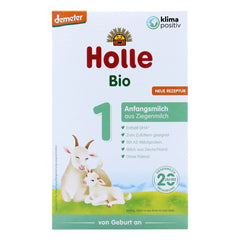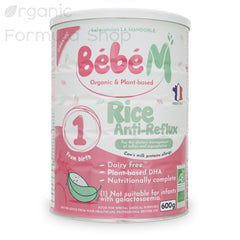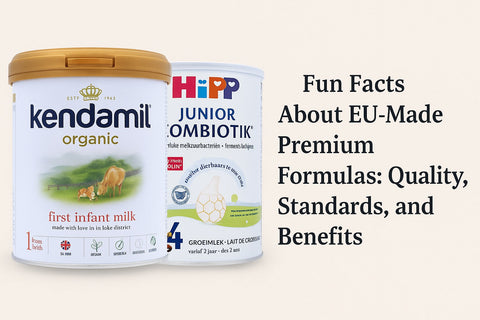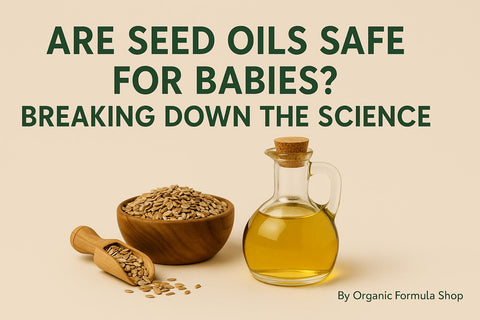Formula for Gassy Babies: Choosing the Right Digestive Health Option
As parents, you do everything you can to ensure your baby receives all the proper nutrients while remaining happy and comfortable. Yet, despite your efforts, your baby may still develop some level of gas.
Although having a gassy baby is normal, it's never easy to see them crying and wiggling in discomfort. If your baby keeps you up at night and is struggling for relief, it might be time to switch to a European Organic Formula for gassy baby needs.
Choosing EU organic formulas over US-made formulas can offer assurance of adherence to stringent organic standards regulated by the European Union, ensuring a higher quality and purity of ingredients. Additionally, EU organic formulas often prioritize the use of non-GMO ingredients and may offer different formulations that cater to specific dietary needs, such as reduced lactose options, providing greater flexibility for parents seeking alternatives for their baby's nutrition.
What Causes Gas?

It takes time for your baby to develop its gastrointestinal tract. From the moment they ingest their first feed, their body works hard, switching from absorbing nutrients from the placenta to breaking down the formula's nutrients. This, as a result, creates a natural build-up of gas.
Not to mention the other external factors that cause gas, like swallowing air during feeds and lying flat for extended periods; these combinations can make a very cranky baby.
But the biggest cause that is often most concerning is the type of formula you feed your baby. Most standard brands and generic formulas contain ingredients that are harsh on a baby's stomach during this sensitive time.
As your baby ages, their body will create a unique microbiome (a collection of good gut bacteria) and be able to process these ingredients and pass the gas quickly. Until then, a certain amount of intervention is needed during their first year.
For a comprehensive guide on addressing your baby's digestive discomfort, check out our article "Gassy Baby? Learn about the Causes, Symptoms and Remedies."
Formula for a Gassy Baby: What to Look For
When choosing European organic formulas for a gassy baby, several factors are essential to consider:
- Organic Certification: Brands like Hipp, Holle, Bebe-M and Lebenswert are all premium Organic Formula Manufacturers who are certified organic by the European Food Safety Authority (EFSA).
- Ingredients: Opt for formulas with easily digestible ingredients such as organic lactose, organic vegetable oils (such as palm, coconut, rapeseed, or sunflower oil), and organic proteins (typically from cow's milk or goat's milk). Avoid formulas containing artificial additives, preservatives, or GMO ingredients.
- Hydrolyzed Proteins: Consider formulas with hydrolyzed proteins, where the protein molecules are broken down into smaller fragments, making them easier to digest and less likely to cause gas or discomfort in sensitive babies (Later more).
- Prebiotics and Probiotics: Look for formulas supplemented with prebiotics (such as oligosaccharides) and probiotics (beneficial bacteria like Bifidobacteria or Lactobacilli), like our popular Hipp Dutch Stage 1, Stage 2 and Stage 3 formulas which can promote a healthy gut microbiota and alleviate gastrointestinal issues like gas and colic.
- Reduced Lactose Options: Some formulas are formulated with reduced lactose content, which can be beneficial for babies with lactose sensitivity or lactose intolerance, leading to reduced gas and bloating.
- Non-GMO and Free from Harmful Substances: Ensure that the formula is free from genetically modified organisms (GMOs) and does not contain potentially harmful substances like pesticides, antibiotics, or synthetic hormones. By ordering EU made Organic Formulas you're 100% certain this is the case!
Different Types of Formula
Organic Formula Shop offers a variety of formulas to cater to the diverse nutritional needs of all babies. It's up to you, your pediatrician and your little one to select a suitable EU-made formula that helps alleviate gas and digestive discomfort in your baby. Here are some types of formula to consider
Cow Milk Organic Formula
As written, milk-based organic formula is made with milk that comes from cows. It is altered to create a close resemblance to breast milk, giving it the right balance of nutrients. Most babies do well on cow formulas and see clear results after switching from the regular formula. The best example is our HiPP Dutch Formula Series and Hipp Comfort Formula which are the most popular cow's milk formula we carry.

HiPP Dutch Stage 1: for babies aged 0 - 6 months of age
HiPP Dutch Stage 2: for babies aged 6 - 12 months of age (Follow On formula)
HiPP Dutch Stage 3: for toddlers aged 12 months and up
HiPP Dutch Stage 4: for toddlers aged 24 months and up

Goat Milk Organic Formula
Though more readily available than cow milk organic formulas, goat milk organic formulas are becoming a popular alternative. This organic formula is naturally high in essential vitamins, and minerals babies need. It is ideal for babies with a slight intolerance to cow milk proteins. However, it should be noted that some babies severely allergic to cow milk can also be allergic to goat's milk. If your baby is allergic, it will exhibit excessive symptoms of gas and additional signs like bloody stool, coughing, and skin rashes. The Most popular Goat Milk Formulas we carry are the German version of our Holle Goat Stage 1 Infant Formula and the Dutch Hipp Goat Formula.

Holle Goat Stage Pre: for infants aged 0 - 6 months of age
Holle Goat Stage 1: for infants aged 0 - 6 months of age
Holle Goat Stage 2: for toddlers aged 6 - 12 months of age
Holle Goat Stage 3: for toddlers aged 10 months and up

HiPP Goat Stage 2: for toddlers aged 6 - 12 months of age
Hydrolyzed Milk Formula
Specialized formulas, specifically hydrolyzed formulas, are great alternatives to traditional formulas. They contain milk proteins that are hydrolyzed or broken down into small molecules. As a result, it's easier for your baby to consume, which means reduced gas symptoms.
The Hypoallergenic Formula Line from HiPP is specially developed for babies prone to allergies. Milk protein can be an essential factor in triggering allergies. The milk protein in the HiPP Hypoallergenic formulas is split into smaller molecules. HiPP HA uses a protein that is wholly hydrolyzed and was proven by studies to prevent allergies. Our most popular Hydrolyzed formula is the HIPP Dutch & German HA-Series. HiPP Hydrolyzed (HA) baby formula is casein-free and contains protein hydrolysates that break down proteins for infants with sensitive stomachs.

HiPP Dutch HA Stage 1: for babies aged 0 - 6 months of age
HiPP Dutch HA Stage 2: for babies aged 6+ months of age

HiPP German HA Stage Pre: for infants aged 0 - 6 months of age
HiPP German HA Stage 1: for infants aged 0 - 6 months of age
HiPP German HA Stage 2: for babies aged 6 - 10 months of age
Please note: HiPP Hypoallergenic (HA) baby Formulas are technically not organic because hydrolyzed milk protein is not available in organic form. However, all other ingredients included are organically sourced.
Formulas For Sensitive Tummies
Some newborns are more sensitive than others. Nothing is worse for parents than seeing their little one dealing with spit-up, gas, painful bloating, or rashes. Organic Formula Shop carries a range of formulas for sensitive tummies, these are developed to help ease some of the most common feeding and digestive issues. These gentle formulas are specially made for babies with cow’s milk protein intolerance, suspected allergies, or reflux.
Vegan/ Plant-Based Non-GMO Formulas
Bebe-M is a dairy-free vegan formula range created with a unique base of 100% organic rice protein hydrolysate. Bebe M formulas are developed to provide all the vital nutrients that growing newborns require to thrive since they believe every baby deserves the best start in life. Bébé M is guaranteed 100% organic & plant based (Vegetarian), milk-free and gluten-free. The vision behind their products is built on a unique nutritional, industrial, and ecological approach: 100% vegetable, based on rice protein hydrolyzate, certified organic farming, without milk or gluten, without added sugar or salt, and soy and palm oil.

BebeM Stage 1: for babies aged 0 - 6 months of age
BebeM Stage 2: for babies aged 6 - 10 months of age (Follow On formula)
BebeM Stage 3: for toddlers aged 10+ months and up
If the formulas highlighted above are not 100% what you're looking for, please check our baby formula comparison chart to help you understand the differences between the formulas we carry.
Conclusion
Gas is a normal phase in a baby's first year of life, but that doesn't mean you can't help ease some discomfort. When you switch to organic formula for gassy baby symptoms, you invest in the best possible nutrition your baby can get. Eventually, the gas issues will resolve, but you'll feel good knowing that the positive effects of organic feeding will continue well into your child's adolescence.
Not sure which formula to order?
Please contact our dedicated customer support team for expert formula advice and guidance tailored to your baby's needs. They have earned hundreds of 5-star reviews from our customers, helping you to provide the best nutrition for your little one. Contact us here or shoot us an email at support@organicformulashop.com. We're here to help!
Please note: every person/baby and situation is different so we always advise you to talk to your pediatrician first and see how these guidelines and tips can help you. This article is not a substitute for professional medical advice, diagnosis, or treatment.




